不定代词讲解
不定代词one,ones,either,neither,both,all的知识讲解
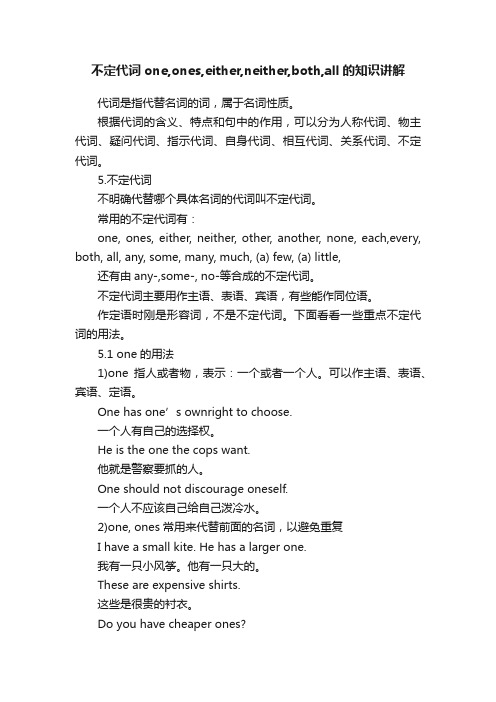
不定代词one,ones,either,neither,both,all的知识讲解代词是指代替名词的词,属于名词性质。
根据代词的含义、特点和句中的作用,可以分为人称代词、物主代词、疑问代词、指示代词、自身代词、相互代词、关系代词、不定代词。
5.不定代词不明确代替哪个具体名词的代词叫不定代词。
常用的不定代词有:one, ones, either, neither, other, another, none, each,every, both, all, any, some, many, much, (a) few, (a) little,还有由any-,some-, no-等合成的不定代词。
不定代词主要用作主语、表语、宾语,有些能作同位语。
作定语时刚是形容词,不是不定代词。
下面看看一些重点不定代词的用法。
5.1 one的用法1)one指人或者物,表示:一个或者一个人。
可以作主语、表语、宾语、定语。
On e has one’s ownright to choose.一个人有自己的选择权。
He is the one the cops want.他就是警察要抓的人。
One should not discourage oneself.一个人不应该自己给自己泼冷水。
2)one, ones常用来代替前面的名词,以避免重复I have a small kite. He has a larger one.我有一只小风筝。
他有一只大的。
These are expensive shirts.这些是很贵的衬衣。
Do you have cheaper ones?有便宜些的吗?5.2 either, neither,both用法either:两者中的一个(任何一个);neither:两者全否定,一个都没有;both:两者全肯定。
Either is right.哪一个都对。
(作主语)Neither is wrong.两个都没错。
不定代词的分类和用法

不定代词的分类和用法不定代词是一类特殊的代词,用来指代不确定的人或物,或者表示泛指、替代和数量的概念。
在英语语法中,不定代词有多种分类和用法。
在本文中,我们将详细介绍不定代词的分类和用法。
一、不定代词的分类1. Indefinite pronouns (不定代词)A. Affirmative Indefinite Pronouns (肯定型不定代词)1) Singular Indefinite Pronouns (单数肯定型不定代词): everybody, everybody, everything, each, everybody, someone, somebody, no one, anything, nobody, somebody, anyone, anything2) Plural Indefinite Pronouns (复数肯定型不定代词): both, several, many, few, many, others, othersB. Negative Indefinite Pronouns (否定型不定代词)1) Singular Indefinite Pronouns (单数否定型不定代词): nobody, nothing, neither, none, no one, nothing2) Plural Indefinite Pronouns (复数否定型不定代词): none, neither, no oneC. Interrogative Indefinite Pronouns (疑问型不定代词): anybody, anyone, anything, somebody, someone, somethingD. Universal Indefinite Pronouns (全称型不定代词): all, both, each, every, any, either, neitherE. Distributive Indefinite Pronouns (分配型不定代词): each, every, either, neither二、不定代词的用法1. 泛指不定代词 (General Indefinite Pronouns)这类不定代词用于泛指不确定对象,表示一个人或事物。
初中英语不定代词讲解及习题
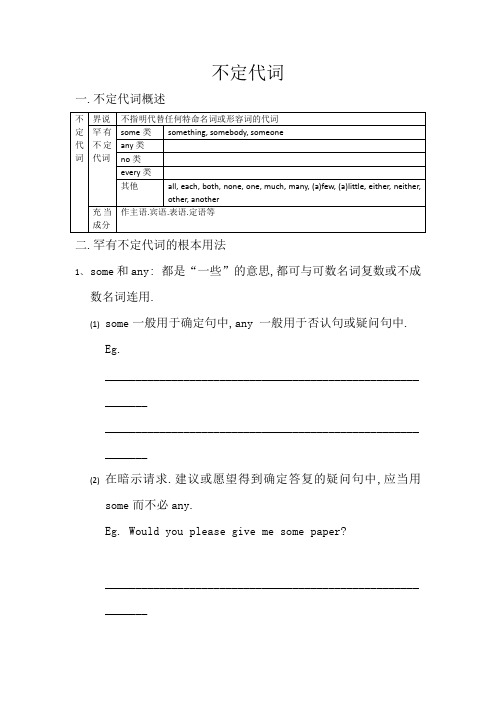
不定代词一.不定代词概述二.罕有不定代词的根本用法1、some和any: 都是“一些”的意思,都可与可数名词复数或不成数名词连用.(1)some一般用于确定句中,any 一般用于否认句或疑问句中.Eg.____________________________________________________ ___________________________________________________________ _______(2)在暗示请求.建议或愿望得到确定答复的疑问句中,应当用some而不必any.Eg. Would you please give me some paper?____________________________________________________ _______(3)当any 暗示“任何”或“无论哪一个”的意义时,可以用于确定句,此时any要重读.Eg. You may come at any time that is convenient to you.___________________________________________________________2、暗示数目的不定代词(1)many______, few_______, a few_______, 用以代替或润饰可数名词.(2)much______, little_______, a little________,用以代替或润饰不成数名词.(3)_______和_______暗示确定意义,_______和_______暗示否认意义.(4)a lot of 和plenty of 等短语既可以润饰可数名词,又可以润饰不成数名词.3.暗示两者和三者的不定代词(1)暗示两者: both, either, neither(2)暗示三者: all, any, none, every(3)暗示确定:both, all(4)暗示否认:none, neither练一练:用以上不定代词填空.我的怙恃都是大夫.__________________________________街道的双方都种了树.There are trees on ______ sides of the street.= There are trees on ______ side of the street.他有两个儿子,都不富有.He has two sons. ______ of them is rich.他有三个儿子,都不富有.He has three sons. ______ of them is rich.三.复合不定代词的用法(1)复合不定代词somebody ,something ,anything,nothing ,everything, everybody等是由some , any ,no ,every, 加上body, thing 组成的,叫做复合不定代词,在句子中当单数应用.(2)somebody, something, someone 一般用于确定句中;anything, anybody,anyone一般用于疑问句和否认句中.(3)假如要在疑问句中暗示请求.建议等确定的意思或者愿望得到确定的答复时,用somebody, someone 或something.(4)润饰复合不定代词的形容词或不定式应放在它们的后面.Eg. He has nothing much to do today.他今天没有若干工作做.Lucy hasn’t anything important to do. 露西没有任何主要时做.四.疑难拓展1.few/a few/little/a little(1)后接名词的不合._______和_______后接可数名词复数,_______和_______后接不成数名词.Eg. There are _______ new words in the text. 课文中有一些新单词.Can you speak _______ English? 你能说一点英语吗?(2)暗示确定意义和否认意义的差别._______和________ 暗示确定,______和_______暗示否认.Eg. I have ________ friends there. I often play with them. There is _______ meat at home. Let’s buy some.2.other/others/the other/another(1)other暗示“另一个”的意思,在句中可作主语.宾语或定语,不自力应用,平日润饰可数名词复数.(2)others可自力应用,无规模限制.(3)other和others前面加定冠词the 时暗示特指,不加the 暗示泛指.The other暗示两个中的另一个,经常应用于句型”one…the other…”,the others 暗示全体其余的人或物.Eg. I have two brothers. ____ is a doctor; ________ is a teacher.He is always ready to help _______.Five of them are in the classroom. What about _______?(4)another(别的一个,又一个),只能代替或润饰单数名词,可用作主语.宾语或定语,不自力应用.前面不加冠词.Eg. Don’t lose heart. Have another try.(5)Another 后可以跟few 或带数字的复数名词.Eg. Just think what our town will be like in another few years.You’d better stay in bed for another two weeks.3、部分否认及完整否认Not与不定代词all, both, every等暗示全体意义的词连用时组成部分否认;若要暗示完整否认,则须要换用none, neither, no 等.练一练:翻译下列句子.4、all, both, each等用作同位语若用作主语同位语,主语可所以名词或代词;若用作宾语等其他成分的同位语,则宾语等成分必须是人称代词,而不克不实时名词.Eg. We all have read it.(all润饰的主语是代词)The village all have been destroyed.(all润饰的主语是名词)They told us all to wait here.(all 润饰的宾语是代词) 5、one 和it 的差别应用(1)it 指代前面的某物.Eg. Where is my pen? I can’t find it.(it 指代前面提到的那支笔)(2)one可以指人,也可以指物.用来代替上文中提到的单数可数名词以及防止反复,其复数情势为ones.Eg. Your pen is so nice. I want to buy one like this.教室练习训练一、单选.1.The two fishermen saw_______ in the sky while they werefishing by a river.A. something strangeB.anything strangeC. strange somethingD. strange anything2. --- Is ____ here? ---No. Bob and Tim have asked for leave.A.anybodyB. somebodyC. everybodyD. nobody3.---Do you want tea or coffee? ---______.I really don't mind4.The old man has two sons .One is a soldier, _______ is a worker.5. There are shops on _____ side of the street.________ of them do not close till 12 at night.A. both; AllB. every; NoneC. either; SomeD. other; Many6. There is not ___ meat in my bowl. There is ____ chicken in it.A. some; anyB. any; someC. any; anyD. some; some7. Could you do___for me, please?A.everythingB. nothingC. somethingD. anything8. Sorry, I can't answer your question. I know____ about the subject.A. a littleB. littleC. fewD. a few9. ---Which would you like, a cup of tea or a glass of milk?----____, thanks. I think I'll just have a glass of water.A. NoneB. NeitherC. BothD. Either10. Tom shook his head and said to us there was _____ in the classroom.A. anybodyB. nobodyC. somebodyD. everybody11. Could I have _____ bottle of apple juice, please?A. anotherB. otherC. some moreD. second12. There are 25 techers in this grade. Eight of them are womenteachers and ______ are men teachers.A. the otherB. the othersC. othersD. other13. They were all tired, but _____of them took a rest.14. ---We have red and yellow T-shirts. Which colour do youlike?--- I’m afraid ____. I think blue will be OK.A. bothB. eitherC. neitherD. none15. ---Can I come this afternoon o tomorrow morning?---_____ is OK. I’m free today and tomorrow.A. EitherB. NeitherC. BothD. None二.按请求完成句子.1. Both Tom and Tim are good at sports.(改为否认句)______ Tom _____ Tim ______ good at sports.2. I can’t speak much English.(同义句转化)I _____ speak_____ English.3. There is something wrong with his eyes.(改为一般疑问句) ______ ______ _______ wrong with his eyes?4. This answer is right. That answer is also right(同义句转化)______ this answer ______ that one are right.5. They haven’t visited the village.She hasn’t visited thevillage either.(连成一句)___________________________________________三.下列句子中各有一处错误,请找出并纠正.1.It is very difficult, and a few people understand it.______________2.Too many work has to be done. ______________3.Why not buy any bread? ______________4.Anyone know how to do it. ______________5.There is not nothing wrong with the radio. ______________家庭功课一、单选.1.The teacher asked the boy many questions, but he only ansewered ______ of them.A.someB. lotsC. eachD. few2. ---I need something for cutting the paper. ---Oh, you want a knife? OK, I’ll get ___ for you.3.Two places of inteerest in Beijing are well known to people from home and abroad. One is the Great Wall, and _____ is the Summer Palace.A. the otherB. anotherC. otherD. others4. ---Would you like _____ to drink? ---Yes. I’d like a cup of coffee.A. something elseB. else somethingC. anything elseD. else anything5. Maybe the disaster can destroy our homes, but ______ can destroy the love in our people.A. somethingB. everythingC. anythingD. nothing二.改错.2. There are many trees on both side of the road. ___________3. He has three sons, but neither of them lives there. ___________4. All of the storybooks is interesting. ___________5. I have important something to tell you. ___________。
不定代词重点讲解

• (四)复合不定代词的特殊用法 • 1. anything but 根本不;nothing but仅仅,
只不过;
• 2. somebody有时有“重要人物”之意, nobody则指“小人物,无名之辈”。
• She rose from being nobody to become a superstar.
• make it clear that... 清楚表明......
部分否定
all of us don't have the chance. 不是所有人有这个机会 both of the boys can't study well 他们不都学习好 every one of us doesn't attend the same
school. 不是每个人上同一个学校
We don't have a car,so we want to buy one. one 指代单数,ones指代复数。
• 2. those是that的复数形式。替代上文出现 的复数名词(尤其是有后置定语时),表特指, 同类不同一。
• The books on the desk are better than those under the desk.
• it, 指代同物 的单数
• them指代同物的复数
1.I love the spring—_____is a wonderful
reasonable.
sound
4.every studenth_a_s__(have )a book.
that,those, it , them
• 1. that替代上文出现的单数可数名词或不可 数名词,表特指,同类不同一,其后总有 修饰语。
不定代词 语法总结

不定代词语法总结
不定代词是用来代替不确定的人或物的代词。
在汉语中,常见的不定代词有以下几类:
1. 人称不定代词:
- 什么人:代表不确定的人或身份。
- 谁:代表不确定的人。
- 哪一个:代表不确定的选择或人物。
2. 物称不定代词:
- 什么东西/东西:代表不确定的物品或事物。
- 哪一个/哪些:代表不确定的选择或物品。
3. 数量不定代词:
- 几个/多少个:代表不确定的数量。
- 若干/一些/许多/少数/大量:代表不确定的数量范围或程度。
4. 陈述性不定代词:
- 有的/有些/有人/有物:表示存在某种情况或特征的人或物。
- 某个/某些:表示不具体指定的人或物。
5. 疑问性不定代词:
- 什么/哪个/谁/多少:表示对未知事物、选择或数量的疑问。
需要注意的是,不定代词在句子中担任名词的角色,可以作主语、宾语等。
在使用不定代词时,要根据上下文和语境来确定其具体意义。
初中不定代词讲解精编版

Fewstudentslikefootball.(谓语复数)(否定意义)
Afewstudentsareintheroom.
(2)little“没有多少”,alittle“少量”,修饰不可数名词;
alittle表示肯定意义,little表示否定意义。
Wehavealittlewater.Thereislittlewaterinthebottle.(几乎没有)
3.Others
是other的复数形式,泛指“另外几个”,“其余的”。在句中可作主语、宾语。如:Someofuslikesinginganddancing,othersgoinforsports.
我们一些人喜欢唱歌和跳舞,其余的从事体育活动。
Givemesomeothers,please.请给我别的东西吧!
Therearenoothers.没有别的了。
4.Theothers
意思是“其他东西,其余的人”。特指某一范围内的“其他的(人或物)”。是theother的复数形式。如:Twoboyswillgotothezoo,andtheotherswillstayathome.
两个男孩将去动物园,其余的留在家里。theothers=theother+复数名词
20.Therearefiftypupilsintheirclass.ofthemareLeaguemembers.
A.BothB.EitherC.AllD.Noone
21.ThestudentshaveonSunday.
A.noanyclassB.notclassC.noclassesD.noanyclass
Iwantsomethingtoeat.
不定代词讲解及练习
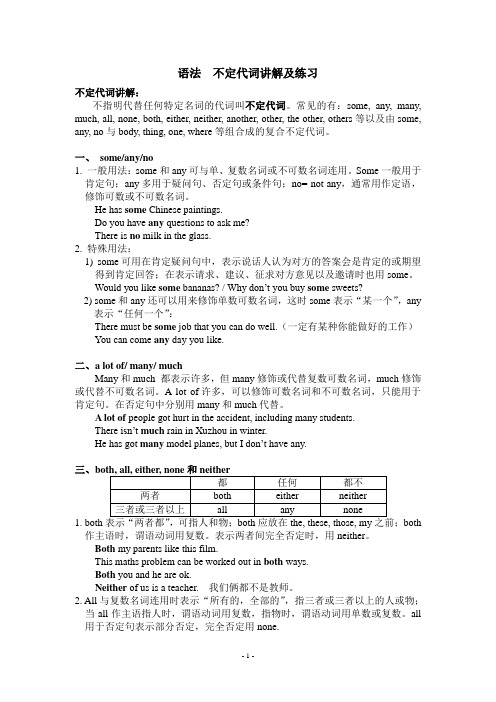
语法不定代词讲解及练习不定代词讲解:不指明代替任何特定名词的代词叫不定代词。
常见的有:some, any, many, much, all, none, both, either, neither, another, other, the other, others等以及由some, any, no与body, thing, one, where等组合成的复合不定代词。
一、some/any/no1. 一般用法:some和any可与单、复数名词或不可数名词连用。
Some一般用于肯定句;any多用于疑问句、否定句或条件句;no= not any,通常用作定语,修饰可数或不可数名词。
He has some Chinese paintings.Do you have any questions to ask me?There is no milk in the glass.2. 特殊用法:1) some可用在肯定疑问句中,表示说话人认为对方的答案会是肯定的或期望得到肯定回答;在表示请求、建议、征求对方意见以及邀请时也用some。
Would you like some bananas? / Why don’t you buy some sweets?2) some和any还可以用来修饰单数可数名词,这时some表示“某一个”,any表示“任何一个”:There must be some job that you can do well.(一定有某种你能做好的工作)You can come any day you like.二、a lot of/ many/ muchMany和much 都表示许多,但many修饰或代替复数可数名词,much修饰或代替不可数名词。
A lot of许多,可以修饰可数名词和不可数名词,只能用于肯定句。
在否定句中分别用many和much代替。
A lot of people got hurt in the accident, including many students.There isn’t much rain in Xuzhou in winter.He has got many model planes, but I don’t have any.三、1. both both 作主语时,谓语动词用复数。
不定代词讲解及练习总结

不定代词讲解及练习总结1. 不定代词的定义不定代词是一类特殊的代词,用来指代人或事物,但没有具体指向的对象。
它们可以在句子中作主语、宾语或定语,并且具有不确定性。
常见的不定代词有:somebody, anybody, nobody, something, anything, nothing等。
2. 不定代词的用法不定代词在句子中的位置和用法与普通的代词相似,根据具体语境决定。
2.1 主语位置不定代词可以作为句子的主语,例如:- Somebody called me yesterday.(有人昨天给我打电话。
)- Anything is possible.(一切皆有可能。
)2.2 宾语位置不定代词可以作为及物动词的宾语,例如:- I can't find anybody here.(我在这里找不到任何人。
)- Have you seen something strange?(你见过什么奇怪的东西吗?)2.3 定语位置不定代词可以用作名词的修饰语,例如:- Is there anything important in the letter?(信中有重要的东西吗?)- I need somebody reliable to help me.(我需要一个可靠的人来帮助我。
)3. 不定代词的练为了更好地掌握不定代词的用法,以下是一些练题:3.1 单项选择题a) Everybodyb) Nobodyc) Anybody2. I don't have ____ to wear to the party.a) somethingb) anythingc) nothing3. ____ is waiting for you outside.a) Somebodyb) Anybodyc) Nobody3.2 句子改写题将以下句子改写成含有不定代词的句子:1. We have a lot of books.(改写成含不定代词的句子)2. The teacher needs a volunteer.(改写成含不定代词的句子)4. 总结不定代词在英语中起着重要的作用,它们可以用来指代不确定的人或事物,并且可以在句子中的不同位置使用。
英语不定代词的简单用法

英语不定代词的简单用法英语不定代词的简单用法导语:不定代词即不指明代替任何特定名词或形容词的代词。
下面YJBYS店铺讲解不定代词的用法,欢迎参考!1. 不定代词概说先说说什么叫不定代词。
所谓“不定”,就是“不确定”“不明确”的意思,所以不定代词就是指不明确表示代替某特定名词或形容词的代词,如someone意为“某人”,something意为“某事”或“某物”,many表示“许多人”或“许多物”,a few表示“几个人”或“几个事物”,等等。
英语的不定代词很多,如some, any, all, each, both, either, neither, one, none, many, much, other, another, no, (a) few, (a) little, enough, every 等,以及由 some, any, no 和 every 构成的复合不定代词(如somebody, anyone, nothing 等)。
2. some与any一般说来,some 用于肯定句中,any 用于否定句、疑问句和条件句中。
如:肯定句:He asked some questions. 他问了一些问题。
否定句:He didn’t ask any questions. 他没有问任何问题。
疑问句:Did he ask any questions? 他问了些问题没有?但是,在表示请求、邀请或征求意见的句子中,通常要用some 而不用any。
如:Shall I get some for you? 要我帮你拿些来吗?Since you have plenty of them, why not give her some? 既然你有那么多,为什么不给她一些呢?any 有时也用于肯定句中,表示“任何”的意思。
如:Any of these may suit you. 这些中间的任何一个都可能适合你。
另外,还有一点要特别注意,汉语可说“任何……都不”,但英语不能说any…not。
不定代词讲解
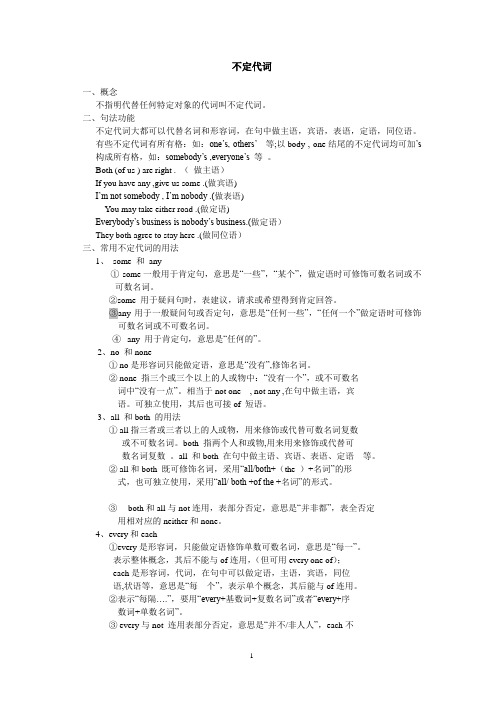
不定代词一、概念不指明代替任何特定对象的代词叫不定代词。
二、句法功能不定代词大都可以代替名词和形容词,在句中做主语,宾语,表语,定语,同位语。
有些不定代词有所有格:如:one’s, others’ 等;以body , one结尾的不定代词均可加’s 构成所有格,如:somebody’s ,everyone’s 等。
Both (of us ) are right . (做主语)If you have any ,give us some .(做宾语)I’m not somebody , I’m nobody .(做表语)You may take either road .(做定语)Everybody’s business is nobody’s business.(做定语)They both agree to stay here .(做同位语)三、常用不定代词的用法1、some 和any① some一般用于肯定句,意思是“一些”,“某个”,做定语时可修饰可数名词或不可数名词。
②some 用于疑问句时,表建议,请求或希望得到肯定回答。
③any用于一般疑问句或否定句,意思是“任何一些”,“任何一个”做定语时可修饰可数名词或不可数名词。
④any 用于肯定句,意思是“任何的”。
2、no 和none① no是形容词只能做定语,意思是“没有”,修饰名词。
② none 指三个或三个以上的人或物中:“没有一个”,或不可数名词中“没有一点”。
相当于not one , not any ,在句中做主语,宾语。
可独立使用,其后也可接of 短语。
3、all 和both 的用法① all指三者或三者以上的人或物,用来修饰或代替可数名词复数或不可数名词。
both 指两个人和或物,用来用来修饰或代替可数名词复数。
all 和both 在句中做主语、宾语、表语、定语等。
② all和both 既可修饰名词,采用“all/both+(the )+名词”的形式,也可独立使用,采用“all/ both +of the +名词”的形式。
不定代词的用法讲解
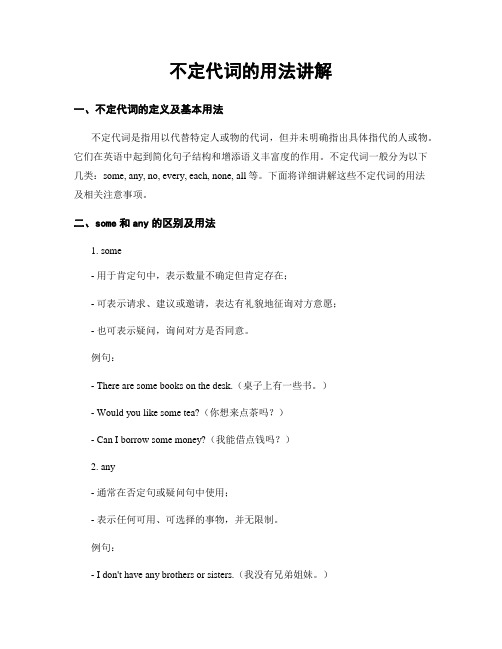
不定代词的用法讲解一、不定代词的定义及基本用法不定代词是指用以代替特定人或物的代词,但并未明确指出具体指代的人或物。
它们在英语中起到简化句子结构和增添语义丰富度的作用。
不定代词一般分为以下几类:some, any, no, every, each, none, all等。
下面将详细讲解这些不定代词的用法及相关注意事项。
二、some和any的区别及用法1. some- 用于肯定句中,表示数量不确定但肯定存在;- 可表示请求、建议或邀请,表达有礼貌地征询对方意愿;- 也可表示疑问,询问对方是否同意。
例句:- There are some books on the desk.(桌子上有一些书。
)- Would you like some tea?(你想来点茶吗?)- Can I borrow some money?(我能借点钱吗?)2. any- 通常在否定句或疑问句中使用;- 表示任何可用、可选择的事物,并无限制。
例句:- I don't have any brothers or sisters.(我没有兄弟姐妹。
)- Have you seen any good movies recently?(你最近看过什么好电影吗?)三、no的使用以及相关用法1. no- 用于否定陈述句中,表示一个或多个人或物不存在;- 也可用于对方提问时给出否定回答。
例句:- There are no apples left in the basket.(篮子里没有苹果了。
)- Is there any milk in the fridge? - No, there isn't.(冰箱里有牛奶吗?——没有。
)2. none- 表示“没有任何一个”,用于否定句中。
例句:- None of them can solve this math problem.(他们谁都不能解决这个数学问题。
)四、every和each的不同用法和意义1. every- 意为“每一”,指代某类事物中的个体,强调全面性。
英语词汇小知识 不定代词详解

英语词汇小知识不定代词详解不定代词是代词种类中相对复杂的一种,数量较多且很多词意思几乎相同但修饰不同类型的名词,因此学习者们很容易混淆使用,犯低级错误导致不必要的丢分。
不定代词在各类考试中都是考查的重点,所以这次就为大家带来不定代词的讲解,希望能给各位学习者们提供帮助。
1.定义:不定代词是不指明代替任何特定名词或形容词的代词。
2.种类:英语中不定代词数量非常多some(something,somebody,someone,somewhere)any(anything,anybody,anyone,anywhere)no(nothing,nobody,no one)every(everything,everybody,everyone,everywhere)all,each,both,much,many,(a)little(a)few,other(s),another,none,one,either,neitherand so on.3.用法比拟:① some和any:两者都是“一些”的意思,都可和可数名词或不可数名词连用。
some一般用于肯定句中或表示请求意义的疑问句;而any那么用于否认句、疑问句或条件从句中.eg.Tom has some picture booksHave you any questions?Why don’t you bring some flowers?② few 与 little:few和a few 后接复数名词,而little和a little后接不可数名词。
few 和 little表示数量很少或几乎没有,强调“少”,含有否认意义,a few 和 a little 那么表示数量虽然少但毕竟还有,强调“有”,含有肯定意义。
eg.He knew few of them.I have only a few of pens.He knew little about it.There is still a little water in the bottle.③ all, every, each:all 强调整体地考虑总体,every 强调考虑总体中的所有成员(与all很接近,但all通常与复数名词搭配,every通常与单数名词搭配),each那么强调逐个逐个地考虑总体,all和each既可单独使用,也可后接名词,还可后接of短语,而every 后必须接名词,既不能单独使用也不能后接 of 短语,each 指两者或两者以上的“每个”,every指三者或三者以上“每个”。
不定代词用法归纳

不定代词用法归纳Company Document number:WTUT-WT88Y-W8BBGB-BWYTT-19998不定代词用法归纳(详细讲解)■本站特约作者陈根花一、不定代词概说英语的有all, each, both, either, neither, one, none, little, few, many, much, other, another, some, any, no, (a) few, (a) little, both, enough, every等,以及由some, any, no和every构成的合成代词(即somebody, anyone, nothing等)。
在这些不定代词中,多数都能作主语、宾语、表语或定语,但是代词none以及由some, any, no和every构成的合成代词只能作主语、宾语或表语,不能作定语,而no和every则只用作定语。
二、指两者和三者的不定代词有些不定代词用于指两者(如both, either, neither),有的不定代词用于指三者(如all, any, none, every),注意不要弄混:Both of my parents are doctors.我的父母都是医生。
All of the students are interested in it.所有的学生对此都很感兴趣。
There are trees on any side of the square.广场的每一边都种有树。
He has two sons, neither of whom is rich.他有两个儿子,都不富有。
He has three sons, none of whom is rich.他有三个儿子,都不富有。
【说明】each可用于两者、三者或三者以上,而every只用于三者或三者以上,因此用于两者时只能用each,不能用every。
如不能说There are trees on every side of the road.三、复合不定代词的用法特点复合不定代词包括something, somebody, someone, anything, anybody, anyone, nothing, nobody, no one, everything, everybody, everyone等。
不定代词的用法总讲解学习
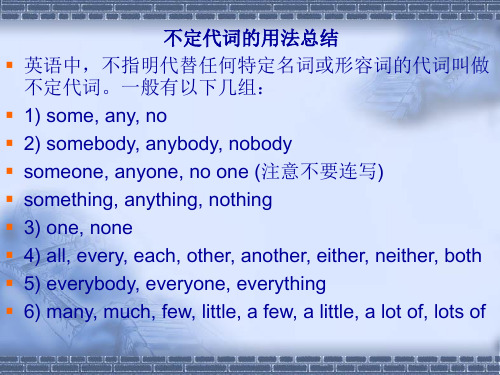
▪ He is not the one who is easily cheated.
▪ (one指人)
▪ I’ve made some cakes. Would you like one of them? (one指物)
▪ I prefer red roses to white ones. (ones指物)
▪ 我坚信会有人来帮助我们的。
▪ I am a stranger. I know nobody here.
▪ 我是一个陌生人,我不认识这里的任何人。
▪ 3. 第二部分为-one和-body的复合代词只能用于表 示人,它们的形式是单数形式,但有时可以用they 或them指代。如:
▪ There is someone in your office. Can you hear them talking?
▪ Are they the ones who moved here a few days ago? (ones指人)
▪ 四、 all, every, each, other, another, either, neither, both
▪ 1. every只有形容词的性质,在句子中作定语。常用 于修饰单数的可数名词。表示“每个;各个”,还 可以表示“一切”。如:
▪ Some of us don’t like the music in this movie. ▪ 我们当中的一些人不喜欢这部电影里的音乐。
▪ Some of the bread has been eaten. ▪ 面包已吃了一些。
▪ Will you get me some apples on your way back? ▪ 在你回来的路上可以给我带一些苹果吗? ▪ some用在疑问句中大多表示“请求” 或“建议”
初中英语中考复习不定代词知识讲解(复合不定代词的应用+常用不定代词的区别)

中考英语不定代词知识讲解一、复合不定代词的分类不定代词是代词中的一个大家族,词如其名,它的性质就是“不定”,所以此类代词不是明确代替任何代词的,通常是指“某XX”。
我们可以按照不同的分类标准来列举不定代词:1.按照构成来进行分类:一类是普通的:one, other, another, either, neither, all, both, many, much, few, little, a few, a little一类是复合的:some-类 someone, somebody, somethingany-类 anyone, anybody, anythingevery类 every, each, everybody, everyone, everythingno-类 no, none, nobody, nothing2.按可数性分类可数:every, each, one, another, either, neither, both, many, few, a few, no one 不可数:much, little, a little可数不可数兼有: no, all, none, some, any, othersome-类复合不定代词和any-类复合不定代词的用法有些类似some和any;1.some-类复合不定代词主要用于肯定句中或预料会得到肯定回答的问句中;any-类复合不定代词主要用于否定句和疑问句中,也可用于肯定句,表示“任何……”之意。
2.some-类复合不定代词和any-类复合不定代词后面加-body或-one时一般指人,加-thing 时一般指物。
3.someone、somebody、anyone、anybody、everyone、everybody、no one 等词后一般不跟 of 短语;需跟of短语通常用some one、any one、every one、none等。
不定代词课件

单数不定代词(如one)和复数不定代词 (如ones)。
按数量意义分类
常见用法
表示确定数量的不定代词(如several)和表 示不确定数量的不定代词(如a few、a little 等)。
不定代词在句子中的位置、与其他词语的搭 配使用、在肯定句和否定句中的变化等。
02
不定代词在句子中位 置
主语位置使用规则
快速浏览全文 在阅读理解中,首先要快速浏览全文,
了解文章的大意和结构。
理解上下文含义 通过理解关键信息所在的上下文含义, 可以更准确地理解不定代词在文章中
的具体用法和意义。
定位关键信息 根据题目的要求,在文章中定位关键 信息,注意寻找与不定代词相关的内 容。
练习寻找关键信息 通过大量的练习,可以提高在阅读理 解中寻找关键信息的能力和速度。
不定代词课件
目录
• 不定代词基本概念 • 不定代词在句子中位置 • 不定代词与其他词类搭配 • 不定代词在各类句型中应用 • 不定代词常见错误及纠正方法 • 不定代词练习与提高策略
01
不定代词基本概念
定义与作用介绍
定义
不定代词是指不特定指代某个或某 些名词的代词,其指代对象具有不 确定性。
作用
不定代词做状语时,可以放在句首、句中或句末,具体位置根据语境和表达需要而 定。
在使用不定代词做状语时,也需注意上下文语境和指代关系,以避免产生歧义。
03
不定代词与其他词类 搭配
与名词搭配注意事项
不定代词修饰名词时,要放在名词前面,如“some books”(一些书)。
当不定代词与形容词同时修饰一个名词时,形容词要放在不定代词之后, 如“something interesting”(有趣的事情)。
初中英语不定代词详细讲解辨析

不定代词1、定义:代替或修饰不特指的人或事物的代词叫不定代词。
英语中有以下不定代词:all, each, every, both, either, neither, one, none, little(a little), few(a few),2、用法1)辨析both, all例:Both of us are right. 我们两个都是对的。
All of you are good at playing basketball. 你们所有人都擅长打篮球。
如:I know all of the four British students in their school.(他们学校里四个英国学生我全认识)--Would you like this one or that one? –Both.(你要这个还是那个?两个都要。
)如:All (of) (the) boys are naughty.(是男孩都调皮)2)辨析either, neither例:Either of the books will do.Neither of them is right.Tom doesn’t play soccer, Jim doesn’t, either= Neither Tom nor Jim play soccer.如:I don’t care much for what to drink. Either of the two will do. (我不介意喝些什么,两个之中随便哪个都行)--Will you go there by bus or by car?–Neither. I will go there by train.(你坐公车去还是坐轿车去?一个都不坐,我坐火车去。
)3)little, a little, few, a fewin the glass.There are few students in the classroom, they’re in the reading-room.例:The bus comes every five minutes.Each of them may come at a different time.如:Every one of the students in his class studies very hard.(他班上每个学生学习都很用功)They are very busy. Each of them has something to do.(他们很忙,人人都有事干)5)some , any如:I have some work todo today. (今天我有些事情要做)They will go theresome day .(他们有朝一日会去那儿)如:Would you like some coffee with sugar ?(你要加糖的咖啡吗?) 如:They didn’t have any friends here. (他们在这里没有朋友) Have you got any questions to ask?(你有问题要问吗?) 。
不定代词的用法教案

不定代词的用法教案第一章:不定代词的基本概念1.1 不定代词的定义1.2 不定代词的分类1.3 不定代词的作用第二章:不定代词的词义辨析2.1 every与each2.2 some与any2.3 no与not any2.4 many与much2.5 few与little2.6 several与some2.7 other与another第三章:不定代词的用法示例3.1 every的用法示例3.2 each的用法示例3.3 some的用法示例3.4 any的用法示例3.5 no的用法示例3.6 not any的用法示例3.7 many的用法示例3.8 much的用法示例3.9 few的用法示例3.10 little的用法示例3.11 several的用法示例3.12 other的用法示例3.13 another的用法示例第四章:不定代词在特定情境下的用法4.1 不定代词在疑问句中的用法4.2 不定代词在否定句中的用法4.3 不定代词在条件句中的用法4.4 不定代词在强调句中的用法第五章:不定代词的练习题及答案5.1 选择题5.2 填空题5.3 翻译题5.4 答案及解析第六章:不定代词的复合结构6.1 every与of的复合结构6.2 each与of的复合结构6.3 some与of的复合结构6.4 any与of的复合结构6.5 no与of的复合结构6.6 not any与of的复合结构6.7 many与of的复合结构6.8 much与of的复合结构6.9 few与of的复合结构6.10 little与of的复合结构6.11 several与of的复合结构6.12 other与than的复合结构6.13 another与than的复合结构第七章:不定代词的替代词7.1 不定代词的替代词的概念7.2 使用替代词的规则7.3 常见的不定代词替代词7.4 替代词在句子中的位置第八章:不定代词的搭配8.1 与不定代词搭配的介词8.2 与不定代词搭配的连词8.3 与不定代词搭配的形容词8.4 搭配实例分析第九章:不定代词的特殊句型9.1 不定代词作主语的特殊句型9.2 不定代词作宾语的特殊句型9.3 不定代词作表语的特殊句型9.4 不定代词作定语的特殊句型9.5 不定代词作状语的特殊句型第十章:不定代词的综合练习10.1 练习题10.2 答案及解析第十一章:不定代词在语境中的应用11.1 日常对话中的不定代词11.2 商务环境中的不定代词11.3 学术写作中的不定代词11.4 不同语境下的不定代词用法对比第十二章:不定代词的翻译技巧12.1 不定代词的词义转换12.2 不定代词在中文中的对应表达12.3 不定代词在翻译中的特殊情况处理12.4 翻译实例分析第十三章:不定代词的错误分析13.1 不定代词的常见错误类型13.2 错误分析与改正13.3 避免错误的策略13.4 练习题及答案第十四章:不定代词的教学方法14.1 教学目标与方法14.2 教学资源与工具14.3 课堂活动与练习14.4 学生反馈与评估第十五章:不定代词的教学案例15.1 初级水平教学案例15.2 中级水平教学案例15.3 高级水平教学案例15.4 不同水平学生的教学策略重点和难点解析本文档详细讲解了不定代词的基本概念、分类、用法示例、特定情境下的用法、复合结构、替代词、搭配、特殊句型、语境应用、翻译技巧、错误分析、教学方法以及教学案例。
2019年高考英语词汇分类讲解:不定代词
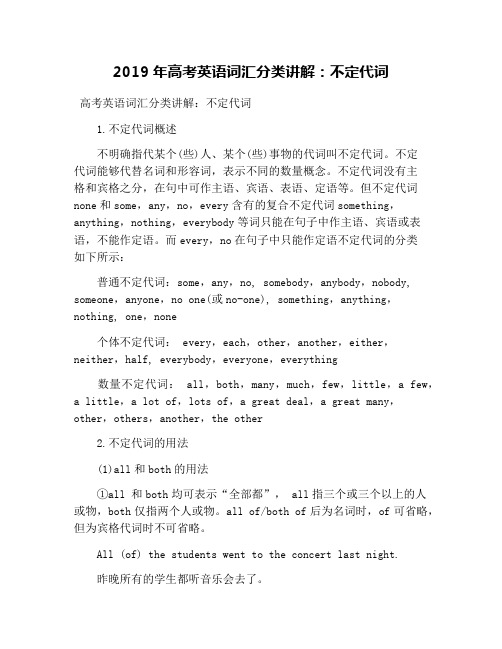
2019年高考英语词汇分类讲解:不定代词高考英语词汇分类讲解:不定代词1.不定代词概述不明确指代某个(些)人、某个(些)事物的代词叫不定代词。
不定代词能够代替名词和形容词,表示不同的数量概念。
不定代词没有主格和宾格之分,在句中可作主语、宾语、表语、定语等。
但不定代词none和some,any,no,every含有的复合不定代词something,anything,nothing,everybody等词只能在句子中作主语、宾语或表语,不能作定语。
而every,no在句子中只能作定语不定代词的分类如下所示:普通不定代词:some,any,no, somebody,anybody,nobody, someone,anyone,no one(或no-one), something,anything,nothing, one,none个体不定代词: every,each,other,another,either,neither,half, everybody,everyone,everything数量不定代词: all,both,many,much,few,little,a few,a little,a lot of,lots of,a great deal,a great many,other,others,another,the other2.不定代词的用法(1)all和both的用法①all 和both均可表示“全部都”, all指三个或三个以上的人或物,both仅指两个人或物。
all of/both of后为名词时,of可省略,但为宾格代词时不可省略。
All (of) the students went to the concert last night.昨晚所有的学生都听音乐会去了。
Both (of) my parents are non-smokers.我父母都不抽烟。
They both accepted my invitation.他们两个人都接受了我的邀请。
